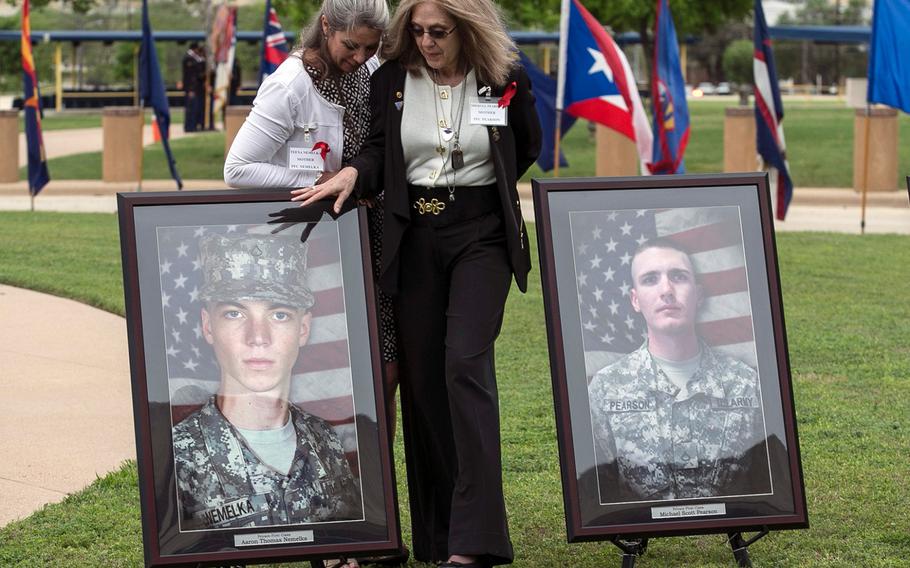
Teena Nemelka, left, mother of Pfc. Aaron Nemelka, left picture, and Sheryll Pearson, right, mother of Pfc. Michael Pearson, right picture, visit one another, on April 10, 2015, at Fort Hood, Texas, before receiving the Purple Heart for their sons who were killed during the attack. (Rodolfo Gonzalez, Austin American-Statesman/Pool photo via AP)
WASHINGTON — Nearly six years after they were attacked by one of their own, the victims of the 2009 Fort Hood shooting have received the Purple Hearts that the Army previously deemed were not owed to them.
At a Friday ceremony at Fort Hood, Texas, base commander Lt. Gen. Sean MacFarland presented the medals to those who were wounded and the families of those who were killed when Army Maj. Nidal Hasan went on a shooting rampage at the installation on Nov. 5, 2009.
“It is our sincere hope that today we will in some small way help to heal the wounds that you have suffered,” said MacFarland, the commander of Army III Corps, which is based at Fort Hood.
Thirteen people were killed and 31 were wounded during the attack before Hasan was subdued. Of those killed, 12 were soldiers and one was a civilian contractor.
MacFarland noted that the carnage could have been much worse had it not been for the bravery of those who responded to the incident.
“We also remember the acts of courage and selflessness of soldiers and civilians which prevented an even greater calamity from occurring that day,” he said. “When shots rang out on Fort Hood, our soldiers and first responders ran toward the sound of gunfire” to “take down the shooter.”
In the wake of the attack, the Army said the Fort Hood casualties were not eligible for the Purple Heart or its civilian equivalent, the Defense of Freedom Medal, because they were not killed or wounded in combat or in an attack by a foreign terrorist organization.
Families of the victims lobbied Congress to change the wording of the law to make their loved ones eligible for the Purple Heart and the recognition of sacrifice that goes along with it.
In the 2015 National Defense Authorization Act, lawmakers loosened the criteria by redefining what should be considered an attack by a “foreign terrorist organization” for purposes of determining award eligibility.
The legislation dictated that an act of violence should now be considered an attack by a foreign terrorist organization if the perpetrator of the attack “was in communication with the foreign terrorist organization before the attack” and the attack was “inspired or motivated by the foreign terrorist organization.”
In a review of the incident and the new provisions of law, the Army determined both these criteria had been met.
“Now that Congress has changed the criteria, we believe there is sufficient reason to allow these men and women to be awarded and recognized with either the Purple Heart or, in the case of civilians, the Defense of Freedom medal. It’s an appropriate recognition of their service and sacrifice,” Army Secretary John McHugh said in a statement in February when the decision to award the medals was announced.
John Bircher, a spokesman for the Military Order of the Purple Heart, a veterans service organization, said he’s glad to see that the soldiers who were killed and wounded were finally given the medal.
“I think it’s something that we all felt was due to them but the [old] criteria of the award just didn’t allow for it,” he said. “For the families of those who were killed in the incident, I think this is a nice closure for them.”
The change in the criteria for the medals has implications beyond the Fort Hood shooting. As the ability of overseas terrorist organizations to conduct attacks against the homeland has been diminished by American military action and other measures, U.S. officials have become increasingly worried about the threat of “lone wolf” attacks that could be conducted by individuals who are inspired to commit violence by overseas extremist groups but are not members of those organizations.
In 2013, after being court-martialed, Hasan was found guilty on 13 counts of premeditated murder and 32 counts of attempted premeditated murder. He is on death row at Fort Leavenworth, Kansas, while post-trial and appellate processes continue.
harper.jon@stripes.com Twitter: @JHarperStripes